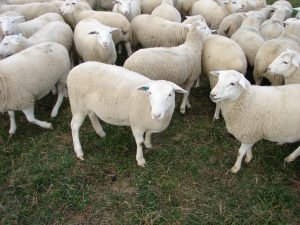By A. O.
Little White Lambs
You have most probably noticed that all lambs have tiny, cute innocent faces. There are also those bigger ones that closely resemble them. They are the mothers of the lambs, that is the ewes. Do you know that there are strong bonds between the lamb and her mother? These strong bonds are established by the time the ewes begin to feed the lambs.
By the time the ewe gives birth to her lamb, she never forgets its smell and the taste she senses while she cleans it with her tongue. That is why she never accepts another lamb having a different taste and smell. This is really astonishing! While a mother in a hospital may well accept somebody else’s baby given to her, a ewe can readily distinguish her own lamb from all others in a crowded flock.
However, the ewe has not much time to get to know her own young one; she has to manage this as soon as she delivers the lamb. Otherwise, she could never find her lamb in a crowded flock again. Yet, she is never afflicted with such a problem, because Allah inspires her to lick her offspring as soon as she gives birth to it so that she can know its taste and smell.
Well, do you know what protects a lamb from rain? It’s skin! As lambskin consists of a soft fatty layer, it serves as a raincoat preventing the lamb from becoming wet. This makes its wool curl and remains dry on rainy days.
Besides, one of the most important characteristics of lambs is their rumination. Have you ever seen an animal ruminating? Let us tell you about it. Some animals that feed on grass ruminate. Characteristically, these animals have a stomach divided into four compartments. When the animal eats something, the food first goes to the stomach then comes back to the mouth again. After the animal chews it, it goes to the other chamber of the stomach. This process is called “rumination”. Our Lord has given this capability to some animals the better to digest some indigestible foods.
Sheep and lambs have many uses for us. Every day they provide milk, and sheep milk is commonly drunk and used in many parts of the world. The calcium in milk is essential for the development of bones and teeth. Some basic foods such as yogurt and cheese are made of milk. Milk is also used for making cakes, pastry, and other dishes. In short, milk is one of the most useful nutrients that we use every day. Furthermore, yarns produced from their wool are used in weaving cloth for us. Yarns and threads used in many other fields have made our lives easier. In the Qur’an, which is the Book Allah has sent down to people, the uses these animals provide men are related as follows:
“Allah has made your houses places of rest for you and made houses for you out of cattle hides which are light for you to carry both when you are traveling and when you are staying in one place. And from their wool and fur and hair, you obtain clothing and carpets and household utensils for a time.” (Al-Nahl: 80)
“We give you pure milk to drink, easy for drinkers to swallow.” (Al-Nahl: 80)
As mentioned in these verses, we benefit from sheep and lambs. We should be very grateful for these blessings that Allah has created for us.
A Note by the Editor:
Allah the Almighty says in the Ever-Glorious Qur’an what means,
“He [Allah] hath created the heavens without supports that ye can see and hath cast into the earth firm hills so that it quake not with you, and He hath dispersed therein all kinds of beasts. And We send down water from the sky and We cause (plants) of every goodly kind to grow therein. This is the Creation of Allah. Now show me that which those (ye worship) beside Him have created. Nay, but the wrongdoers are in error manifest!” (Luqman 31: 10-11)
And,
“We shall show them Our portents on the horizons and within themselves until it will be manifest unto them that it is the Truth. Doth not thy Lord suffice since He is Witness over all things? How! Are they still in doubt about the meeting with their Lord? Lo! Is not He surrounding all things?” (Fussilat 41: 53-54)
———
A. O. is a Turkish writer and author.
 Arabic
Arabic English
English Spanish
Spanish Russian
Russian Romanian
Romanian korean
korean Japanese
Japanese

